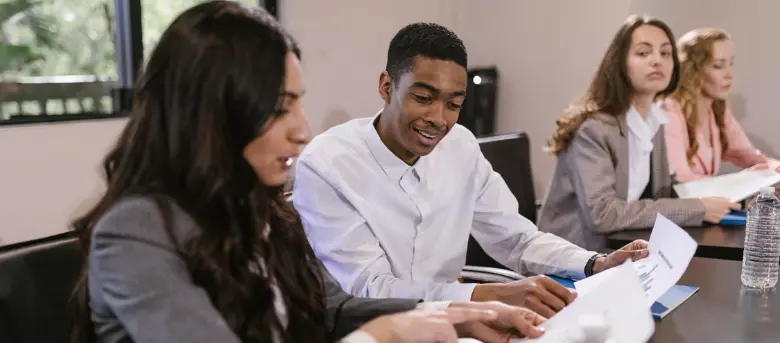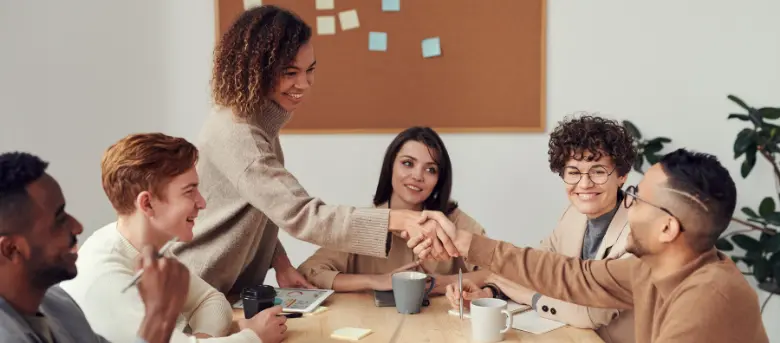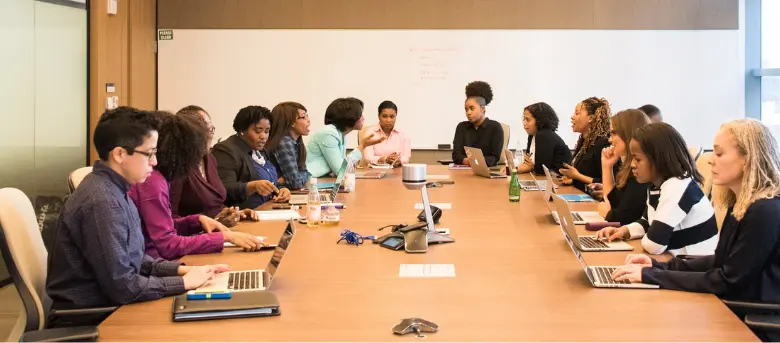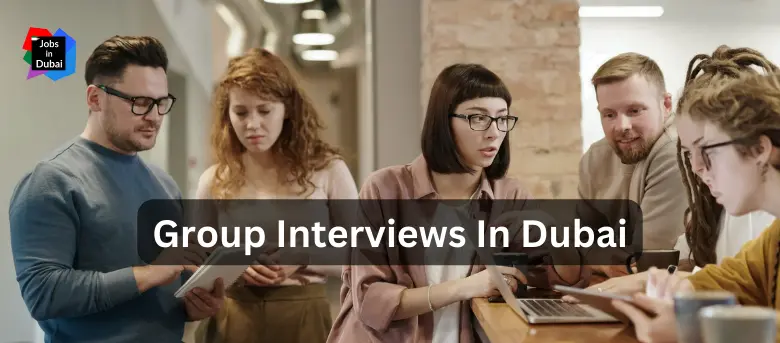Navigating the group interview process in Dubai can be a daunting task. This blog “Group Interviews in Dubai: A Comprehensive Guide” provides valuable insights and practical tips to help you excel in group interviews. With a focus on commonly asked questions, interview techniques, and what to expect, this guide is an essential read for anyone looking to succeed in Dubai’s competitive job market.
What is a Group Interview? Why Are Group Interviews Popular in Dubai?
Group interviews, a common practice in Dubai’s hiring process, involve multiple candidates being interviewed simultaneously. This format assesses candidates’ interpersonal skills, teamwork, and problem-solving abilities in a group setting. It’s a dynamic and interactive way for employers to gauge potential hires.
In Dubai’s fast-paced job market, group interviews are an efficient way for managers to identify candidates with the right mix of skills and cultural fit. They provide insights into a candidate’s ability to collaborate, communicate effectively, and handle real-time challenges.
Top Reasons Why Group Interviews Are Popular For Jobs in Dubai
Efficient Candidate Assessment: Group interviews allow hiring managers to evaluate multiple candidates simultaneously, making the hiring process more time-efficient. This approach is particularly beneficial in Dubai’s fast-paced job market, where the ability to identify suitable candidates quickly is crucial.
Evaluation of Teamwork and Interpersonal Skills: The diverse and team-oriented work culture in Dubai places a high value on an individual’s ability to collaborate effectively. Group interviews provide a practical setting to observe candidates’ teamwork dynamics, conflict resolution assessment, and overall interpersonal interactions.
Assessment of Communication Skills: Communication is key in any workplace, and group interviews offer a direct way to assess candidates’ verbal expression and active listening abilities. This is vital in Dubai’s multicultural environment, where clear and effective communication is essential for successful business operations.
Cultural Fit and Adaptability: With its diverse workforce, Dubai’s employers are keen on hiring individuals who can seamlessly adapt to different cultural settings and work styles. It helps assess how well candidates can integrate with a diverse team and whether they align with the company’s culture and values.
Leadership Potential and Initiative: It can highlight individuals who naturally take on leadership roles or demonstrate significant initiative. This is particularly important in Dubai’s dynamic business landscape, where leadership and the ability to take charge are highly valued traits.
Pressure and Stress Handling: The group setting can create a competitive atmosphere, allowing employers to see how candidates handle stress and if they can maintain composure and professionalism under pressure.
These reasons underscore the effectiveness of identifying job seekers who are skilled and a good fit for the unique demands of Dubai’s vibrant and diverse job market.
Understanding the Group Interview Process in Dubai

Group interviews are a unique and interactive assessment form used by many organizations, including those in Dubai. Understanding the structure and process of these interviews can significantly enhance your preparation and performance.
Here’s a breakdown of the typical stages of a group interview process:
Group interviews are a unique and interactive form of assessment used by many organizations, including those in Dubai. Understanding the structure and process of these interviews can significantly enhance your preparation and performance to get the job. Here’s a breakdown of the typical stages of the interview process:
Introduction and Briefing
Organizer Introduction: The interview usually starts with the interviewers or HR personnel introducing themselves and explaining the format and objectives of the group interview.
Candidate Introduction: Candidates may be asked to submit their CVs and introduce themselves, including sharing their background, skills, and reasons for applying. This is an opportunity to make a memorable first impression.
Group Activities
Team-Based Tasks: Candidates might be divided into smaller groups and given a task or project to work on. These tasks assess teamwork, leadership, communication, and problem-solving skills.
Discussion Topics: Groups might be given a topic to discuss. This assesses candidates’ abilities to articulate thoughts, listen to others, and engage in constructive dialogue.
Problem-Solving Exercises
Case Studies: Candidates may be presented with a case study relevant to the job or industry and asked to provide solutions or strategies.
Role-Playing Scenarios: These exercises simulate real-life job scenarios to evaluate how candidates might perform in the actual work environment.
Individual Presentations
Presentation of Group Work: Groups or individuals may be asked to present their findings or solutions from the earlier group activities.
Personal Pitch: Sometimes, candidates might be asked to give a short personal pitch, summarizing their strengths and suitability for the role.
Question and Answer Session
From Interviewers: The interviewers may ask questions about the candidates’ performance during the group exercises or about their qualifications and experience.
From Candidates: This is also a chance for candidates to ask questions about the role, company, or next steps in the hiring process.
Observation and Assessment
Throughout all stages, interviewers observe the candidates’ behaviours, interactions with others, and performance in exercises. They assess qualities like leadership, teamwork, creativity, and adaptability.
Conclusion and Follow-Up
Closing Remarks: The interviewers conclude the session, often providing information on what to expect next in the recruitment process.
Post-Interview Communication: Candidates might receive feedback or be informed about their progress to the next stage of the process.
After the interview, consider following up with a thank you email. This could lead to further discussions and even an offer. Be sure to include a personal touch, like mentioning a topic that was discussed or a specific aspect of the interview process that you enjoyed. This shows that you were engaged and genuinely interested in the role.
Insight On How to Excel in Group Activities and Discussions

In a group setting, standing out positively is crucial. Engage actively but respectfully with others, show leadership qualities without dominating the conversation, and demonstrate effective communication skills.
- Show Leadership Qualities: Take the initiative to lead the group, if appropriate. This could mean offering to organize the group’s thoughts, setting up a plan for tackling the task or volunteering to present the group’s findings. However, it’s crucial to do this without overpowering others. Leadership is as much about listening and incorporating others’ ideas as it is about guiding the group.
- Demonstrate Effective Communication Skills: Communicate your ideas clearly and confidently, but also be an active listener. Acknowledge and build upon others’ contributions, showing that you value teamwork and collaboration.
- Exhibit Problem-Solving Abilities: Many group activities are designed to assess problem-solving skills. Approach the task analytically, offer creative solutions, and demonstrate your ability to think critically under pressure.
- Show Emotional Intelligence: Be aware of the group dynamics and be sensitive to others’ feelings and perspectives. Encourage quieter members to contribute and respect differing opinions, showing that you can work well in a diverse team.
- Be Confident but Not Dominating: Confidence is key, but there’s a fine line between being assertive and dominating. Ensure that your contributions are substantial but don’t try to take over the entire discussion. The goal is to be a team player, not a solo star.
- Stay Focused on the Goal: Keep the group on track toward the objective of the activity. If the discussion veers off course, gently steer it back to the task at hand.
- Exhibit Enthusiasm and Positive Attitude: Show genuine interest in the task and enthusiasm for working with the group. A positive attitude can be contagious and helps create a collaborative environment.
- Prepare Thoroughly: If you know the type of industry or role you’re interviewing for, research potential challenges or tasks you might face in a group setting. Being well-prepared can help you contribute more effectively.
- Reflect on Your Role Post-Activity: After the exercise, if given the opportunity, reflect on what you learned from the activity and how you contributed to the group’s success. This shows self-awareness and a commitment to continuous improvement.
- Use Body Language Effectively: Non-verbal cues are crucial in group settings. Maintain eye contact, nod in agreement, and use open body language to show engagement and respect for your peers’ ideas.
During the group interview, pay attention to body language. It’s not just about what’s said; how you say it can be just as important. As an interviewee, demonstrate your ability to listen carefully, assess situations, and engage effectively with others. This is crucial, whether it’s a panel interview, a one-on-one interview, or a group setting.
Group Interview Experience: Let’s Dive into Activities and Interview Process Length

In an interview, several activities are typically conducted to assess the abilities and compatibility of candidates.
Here’s an overview of common activities you might encounter:
- Ice-Breaker Introductions: Candidates may be asked to introduce themselves, sharing basic information like their background, skills, and why they’re interested in the job. This helps break the ice and makes them more comfortable.
- Group Discussions: Participants might be given a topic or a problem to discuss as a group. This assesses communication skills, ability to work in a team, leadership qualities, and problem-solving skills.
- Role-Playing Scenarios: Candidates might be asked to act out scenarios that are relevant to the job they’re applying for. This could involve handling a difficult customer or collaborating on a project. It’s a way to see how they would perform in real-world situations.
- Team-Building Exercises: Activities that require candidates to work together to solve a problem or complete a task. These can range from simple puzzles to more complex projects, aiming to evaluate teamwork, creativity, and time management.
- Case Studies or Project Discussions: In some cases, candidates might be given a case study or a project brief to discuss or work on, especially for more specialized roles. This is to assess analytical thinking and how well they understand the industry.
- Question and Answer Sessions: Either in a group setting or individually, candidates might be asked to respond to typical interview questions. This helps interviewers gauge each candidate’s suitability for the role and company.
- Group Presentations: Candidates might be divided into smaller groups and given a topic to present on. This tests public speaking skills, the ability to work under pressure, and how well they can collaborate with others.
- Interactive Activities: Some interviews may include more interactive or unconventional activities designed to see how they think on their feet or handle unexpected situations.
- Feedback and Observations: Often, the interviewers observe how job seekers interact with each other, how they approach tasks, and how they contribute to discussions. This provides insight into each candidate’s personality and work style.
Remember, each company and role may have different requirements, so the specific activities in a group interview can vary. It’s always a good idea to research the company and role beforehand to better understand what might be expected.
How Long are Group Interviews
The duration of group interviews and interview process length can vary depending on several factors, such as the company, the position being filled, the number of candidates participating, and the nature of the activities planned. Generally, group interview details in Dubai can be outlined as follows:
Short Interviews:
Duration: Approximately 1-2 hours.
These are often used for initial screening processes or when the activities involved are relatively straightforward, such as basic group discussions or brief problem-solving exercises.
Standard Interviews:
Duration: Around 2-4 hours.
This is a common length for interviews, allowing time for a mix of activities like group discussions, role-playing, team exercises, and individual questioning.
Extended Interviews:
Duration: A half-day to a full day (4-8 hours or more).
Extended interviews are usually comprehensive, involving detailed activities such as complex group tasks, multiple team-building exercises, in-depth discussions, presentations, and sometimes even one-on-one interviews as part of the process.
For high-level positions, leadership roles, or jobs requiring extensive team collaboration or creative problem-solving, the interview process might be more extended and intensive. It’s also not uncommon for certain industries or top companies to conduct interviews over multiple sessions or days, especially if they include assessments, workshops, or social interaction components.
It’s always a good idea to ask the employer for an estimated duration when you’re invited to an interview, so you can plan and prepare yourself for your interview
Common Group Interview Questions in Dubai
In a group interview setting in Dubai, you can expect a variety of questions that assess not only your professional qualifications and experience but also your ability to work effectively in a team, communicate, and adapt to the cultural and business environment of Dubai. Here are some common questions and interview tips to answer them.
Tell us about yourself
This question is a staple in many interviews. It’s your opportunity to make a strong first impression by highlighting your background, skills, and why you are interested in the position.
Why are you interested in working for our company?
Interviewers in Dubai, like elsewhere, want to know if you’ve done your homework about the company and if you have a genuine interest in being a part of their team.
How do you handle conflict in a team setting?
Dubai’s workplaces often feature diverse teams, so employers look for candidates who can navigate conflicts respectfully and effectively.
Describe a time when you had to work closely with others on a team.
This question assesses your teamwork and collaboration skills, which are crucial in a group work environment.
How do you prioritize your work when dealing with multiple deadlines?
Employers in Dubai often seek candidates who can efficiently manage their time and workload, especially in fast-paced work environments.
Can you give an example of when you showed leadership skills?
Even if you’re not applying for a leadership role, demonstrating leadership abilities can be a significant advantage.
What do you know about our industry and competitors?
This question tests your market awareness and understanding of the industry specific to Dubai and the broader region.
How would you handle a situation where a team member is not contributing their fair share?
This assesses your problem-solving and interpersonal skills in a team dynamic.
What are your career aspirations?
Employers may ask this to gauge whether your long-term goals align with the company’s trajectory and opportunities for growth.
What do you think are the most important qualities for someone to excel in this role?
This question allows you to align your skills and qualities with what is required for the job.
How would you describe your work style?
Understanding your work style helps employers determine how well you would fit into their company culture.
Remember, the first interview is your opportunity to make a lasting impression. It’s a chance to showcase not only your skills but also how you can contribute to a group dynamic. When discussing your current job or sharing your experiences, highlight instances where you had to prioritize tasks or work collaboratively. These anecdotes help you determine what’s relevant to the interviewer and what’s not.
Conclusion for Group job interviews for Jobs in Dubai
- Group interviews in Dubai require a blend of individual expertise and team collaboration skills.
- Prepare by researching common questions and understanding the company culture.
- Engage actively in group discussions and activities, showing both leadership and teamwork.
- Follow up post-interview to leave a lasting positive impression.
- Use feedback as a learning tool to enhance your interview skills.
Mastering interviews in Dubai opens doors to exciting career opportunities. With the right preparation and mindset, you can navigate these challenges successfully and advance in your professional journey.


